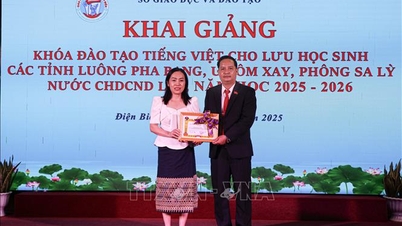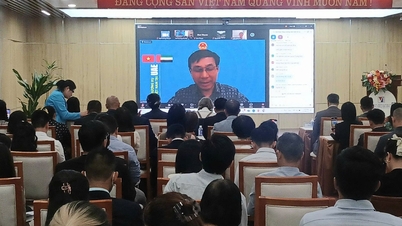
Teachers and students of Phan Huy Chu High School ( Hanoi ) in a class - Photo: NAM TRAN
Notably, regarding salary, the law stipulates that teachers' salaries are ranked highest in the administrative career salary scale system. Professional incentives and other allowances depend on the nature of the job and the region.
Many policies to support teachers
Those eligible for higher salary allowances include preschool teachers; teachers working in ethnic minority areas, mountainous areas, border areas, islands and areas with especially difficult socio -economic conditions; teachers in specialized schools; teachers implementing inclusive education; and teachers in certain specific sectors and occupations.
The newly passed law also clearly stipulates a system of policies to support teachers, including subsidies based on the nature of work and location; training and development support; periodic health care and occupational health; mobility allowances for teachers working on literacy, universal education , secondment, intensive teaching, inter-school teaching, teaching at separate schools, etc.
For teachers working in mountainous, border, island areas, areas with special socio-economic difficulties or teaching in specialized schools, inclusive education, teaching ethnic minority languages, enhancing Vietnamese, gifted and artistic... if they have not been arranged public housing or collective accommodation, they will be supported with housing rent at an equivalent level. In addition, they are supported with travel expenses and payment of train and bus fares when working in difficult areas.
The law supplements a group of policies to attract and promote teachers for those with high qualifications, special talents, those working in disadvantaged areas or participating in teaching and research in key fields. These policies include priority in recruitment and reception; salary and allowance support; training, planning, appointment; working conditions and equipment; welfare and other support according to the law...
Joy, hope
The passing of the Law on Teachers is a joy and hope for those who are attached to the education sector. Ms. Nguyen Thi Thu Anh - member of the National Council for Education and Human Resources Development of Vietnam - shared: "As a former education manager, understanding the hardships of teachers, I was truly moved when the National Assembly officially passed the Law on Teachers.
Teachers' salaries have been raised to the highest level in the administrative and career salary scale system, with seniority allowances, career incentives, regional-specific subsidies, health support, training, etc. This will be the motivation for teachers to strive to contribute and will contribute to attracting talented and capable young people to work in the education sector."
"I hope the law will soon be put into practice, because this is what many teachers expect," said Ms. Nguyen Thi Nhiep, principal of Chu Van An High School (Hanoi). She is more concerned about the law being the basis for creating a working environment that can encourage teachers to contribute. Because a good working environment is the real factor to attract and retain teachers, and is the foundation for improving quality, overcoming stagnation and inadequacies as they have existed.
There are teachers with low salaries who are still committed to their profession, still enthusiastic because they are respected, recognized and protected. On the contrary, there are people who have a stable income from their profession but they still choose to leave because the working environment does not bring them happiness and peace of mind.
Teacher Nguyen Xuan Khang - chairman of the school board of Marie Curie Inter-level School (Hanoi) - who over the past three years has provided a lot of support to help the disadvantaged area of Meo Vac (Ha Giang) overcome the serious shortage of teachers - shared: "In Meo Vac, for many years, we have not been able to recruit English teachers, mainly because there is no recruitment source.
Young people graduated from teacher training but did not want to join the education sector in the disadvantaged areas. When I proposed to the district People's Committee to create a source by recruiting local people to send to teacher training, supporting the tuition fee during the teacher training period, after 3 years, there are now 3 more teachers to supplement this locality.
Talking about the difficulty of recruiting teachers like this is to emphasize that although high salaries as stipulated in the law are a good thing, they are not enough. Along with that, there needs to be synchronous policies that are suitable to the regional characteristics of each region," Mr. Khang shared.
Commenting on the remarkable new points in the Law on Teachers that has just been passed, Ms. Nguyen Thi Thu Anh also said: Clarifying the system of titles and professional standards for each level of education in the Law on Teachers will be the basis for teachers to be fairly evaluated, have a clear development roadmap and help schools more easily in selecting, using and training staff, contributing to improving the quality and professionalism of the teaching staff.
"I strongly agree with giving autonomy to educational institutions in recruiting and using teachers. Autonomy must always go hand in hand with self-responsibility. Having a good staff will be the driving force to improve the quality of education and vice versa.
I am particularly interested in the new policies on international cooperation. The law has opened up opportunities for Vietnamese teachers to participate in international training and academic exchanges, and at the same time welcome foreign teachers to teach and research. This is a great opportunity for the Vietnamese teaching staff to develop more comprehensively and reach out to the world," Ms. Anh expressed.

Students of Y Jut Primary School (Krong Pac district, Dak Lak) during an outdoor physical education class - Photo: MINH PHUONG
Dedicated to teaching
Mr. Nguyen Tien Chuong - Vice Principal of Cao Nguyen Practice School (Tay Nguyen University, Buon Ma Thuot City, Dak Lak Province) - said that the new Law on Teachers brings an exciting atmosphere to the entire education sector.
He added that the National Assembly's passing of a resolution to rank teachers' salaries at the highest level in the system of cadres, civil servants and public employees is "a great joy" for the entire education sector as well as each teacher and manager like him.
"With the new salary, teachers can fully devote themselves to teaching and stabilize their family life without having to worry about extra work or depending on extra teaching or learning like before," said Mr. Chuong.
He said that this salary increase, along with the regulation on standardizing extra teaching and learning activities that took effect from February 14, are two synchronous steps, demonstrating the great efforts of the State in improving the quality of education in a substantial direction.
Will continue to perfect legal documents
Mr. Vu Minh Duc, Director of the Department of Teachers and Educational Managers (Ministry of Education and Training), said that in addition to income, teachers need a friendly working environment, where their capacity and creativity can be developed, protected and respected.
"After the Law on Teachers is promulgated, within its authority, the Ministry of Education and Training will continue to complete legal documents to regulate and guide the Departments of Education and Training and schools in implementing this. But besides that, it also needs the attention of localities, schools and society," said Mr. Duc.
The law does not prohibit private tutoring.
The law also specifically stipulates actions that teachers are not allowed to do, such as forcing students to take extra classes or collecting illegal fees. Mr. Nguyen Dac Vinh said that the law does not prohibit extra teaching, but only stipulates that teachers are not allowed to force students to take extra classes in any form to overcome the widespread situation of extra teaching. The requirement that teachers are not allowed to give extra lessons to students they are directly teaching is currently stipulated in the circular on extra teaching and learning of the Ministry of Education and Training.
Creating opportunities for educational development

A Vietnamese lesson of a second grade teacher and students at Tan Son Nhi Primary School, Tan Phu District, Ho Chi Minh City at the school library - Photo: NHU HUNG
MSc. Le Ngoc Diep, former head of the Primary Education Department of the Ho Chi Minh City Department of Education and Training, commented: "The Law on Teachers is a remarkable step forward, creating opportunities for the development of Vietnamese education. It is especially meaningful when the Politburo recently decided to completely exempt tuition fees for students from kindergarten to high school nationwide.
Previously, some teachers had to find out what the school principal or the head of the education department thought before they dared to propose activities. From now on, teachers have a clear rule.
Based on that, teachers will perform their duties confidently, without having to seek the opinions of managers to please them. In addition, education management levels from local to central levels also have a law to carry out their duties. I believe that the Law on Teachers will create strong changes for the country's education system."
Master Nguyen Viet Dang Du, a teacher at Le Quy Don High School (District 3, Ho Chi Minh City), expressed his mixed feelings of joy and worry. "Teachers' salaries are ranked at the highest level in the administrative salary scale system, showing the State's respect for teachers and the tradition of studiousness of our people.
However, in addition to the fixed salary, we teachers have always had a teaching allowance. Teachers in Ho Chi Minh City also have an additional income according to Resolution 08 of the Ho Chi Minh City People's Council. In the quarters when I complete my tasks excellently, this additional income is quite high, equivalent to my fixed salary (before tax).
Not to mention that colleagues in remote areas will also have additional allowances for teachers in remote areas. Therefore, we are worried that when salary reform is implemented, there will no longer be allowances like the current ones. And we are nervous that even if the new salary is the highest in the salary scale, will it be enough to live on?" - Mr. Du asked.
Similarly, Ms. Th. - a math teacher in Thu Duc City, Ho Chi Minh City - also expressed: "I am excited because my profession has been regulated by law. This has a special meaning for those who are standing on the podium like me. It shows that the State considers education as a top national policy, teaching is a noble profession and teachers are respected, receiving salaries according to special treatment regimes...
Regarding teachers' salaries, in recent years, teachers in Ho Chi Minh City have had a fairly stable income. Because the leaders of Ho Chi Minh City have paid special attention to education, only teachers in Ho Chi Minh City have had an increased income thanks to this attention. Therefore, the life of teachers in the city is not as difficult as in the past. Instead of working extra jobs, we are confident in dedicating ourselves to our profession.
Both my husband and I are teachers, and our salaries and allowances are enough to provide our children with a proper education. Now that I hear that teachers' salaries are the highest in the salary scale, I am very happy. But I am also wondering whether the allowances will be maintained when teachers' salaries are recalculated in the near future," said Ms. Th.
Regarding the matter of not banning teachers from giving extra classes, Mr. Dang Du also expressed his opinion: "The origin of extra classes is the method of examination. Therefore, not only teachers but also students have the need to take extra classes.
Forbidding teachers from tutoring their regular students is creating disadvantages for students. The bad thing about tutoring is forcing students. This is something that schools can completely sanction if there is a legal corridor.
MSc. Le Ngoc Diep also suggested that the Ministry of Education and Training should have more flexible regulations on extra teaching and learning. "Learning from teachers has been a tradition of our people from ancient times to the present. For students who need extra classes to consolidate or improve their knowledge, management levels need to create conditions for students to be able to study with good teachers. And the teachers themselves also have the opportunity to use their talents to contribute more to life.
The current ban on extra tutoring will likely waste teachers' talents and knowledge and cause disadvantages for students when they do not get to study with good teachers," Mr. Diep added.
* Ms. Le Di Thanh (Principal of An Khanh High School - Can Tho City):
Solve many industry bottlenecks
First of all, as a teacher, I am very happy that the National Assembly passed the Teachers Law this time, which includes many policies and benefits for teachers. Of course, when teachers are ranked with high salaries, teachers themselves need to actively change to meet new demands.
As a manager, I expect the Law on Teachers to be of great significance to the education sector. Placing teachers’ salaries at the highest position in the career salary scale will solve one of the biggest bottlenecks in the sector: attracting and retaining talent. Until now, the pressure on income often causes many good students not to choose the teaching profession, or competent teachers to seek opportunities in other fields.
Furthermore, this policy will significantly improve the social status of teachers. When income is guaranteed and the State cares for them along with other benefits, the teaching profession will gradually become more attractive, attracting excellent individuals with pedagogical qualities. This creates conditions for building a team of high-quality teachers with solid professional capacity and clear professional ethics.
The fact that teachers receive the highest salary in the career salary system will directly affect the right motivation of teachers. When the main income from teaching is enough to cover living expenses, financial pressure will be significantly reduced, teachers will have a stronger motivation to focus on investing in the content of their lessons more deeply, with better quality, and have more time to care for each student. And this will also limit extra teaching and learning.
In addition, high salaries can also help solve other problems such as improving the quality of the team because attractive salaries will attract good and excellent students to the teaching profession, and at the same time retain talented and experienced teachers. This will create a high-quality team of teachers, capable of better meeting the requirements of educational innovation in the new trend.
In addition, it also increases the respect for the profession in society: the State's issuance of salary policies for teachers not only recognizes the merits and contributions of teachers but also enhances the position and prestige of teachers in society, contributing to creating a positive and developing educational environment.

Teaching and learning English for grade 4 at Ngo Quyen Primary School (Ninh Kieu District, Can Tho City) - Photo: THAI LUY
* Mr. Thai Quang Binh (Principal of Ong Ich Khiem High School, Hoa Vang District, Da Nang)
Motivation to continue contributing
This decision demonstrates the concern of leaders at all levels for the team of teachers and staff in the education sector. This information really motivates everyone to continue to stick with and make efforts in the profession.
For a long time, we have heard that teachers' income will be improved, but we have not seen any specific policies. In society, many people think that teachers' salaries are high, but in reality, they are not, so most teachers are still waiting for a real change. When their income is guaranteed, teachers will certainly feel more secure and devoted to their work.
But I believe that anyone who has chosen the teaching profession is fully aware of the responsibility of teaching, regardless of whether the salary is high or low. Only a very few have not fulfilled their duties, but in my opinion, the problem is not the salary but the professional conscience - that is the core.
Source: https://tuoitre.vn/nha-giao-duoc-tang-luong-nang-chat-luong-giao-duc-20250616215915488.htm



![[Photo] General Secretary To Lam meets voters in Hanoi city](https://vphoto.vietnam.vn/thumb/1200x675/vietnam/resource/IMAGE/2025/9/23/d3d496df306d42528b1efa01c19b9c1f)
![[Photo] The 1st Congress of Party Delegates of Central Party Agencies, term 2025-2030, held a preparatory session.](https://vphoto.vietnam.vn/thumb/1200x675/vietnam/resource/IMAGE/2025/9/23/e3a8d2fea79943178d836016d81b4981)
![[Photo] Prime Minister Pham Minh Chinh chairs the 14th meeting of the Steering Committee on IUU](https://vphoto.vietnam.vn/thumb/1200x675/vietnam/resource/IMAGE/2025/9/23/a5244e94b6dd49b3b52bbb92201c6986)

![[Photo] Editor-in-Chief of Nhan Dan Newspaper Le Quoc Minh received the working delegation of Pasaxon Newspaper](https://vphoto.vietnam.vn/thumb/1200x675/vietnam/resource/IMAGE/2025/9/23/da79369d8d2849318c3fe8e792f4ce16)































































































Comment (0)